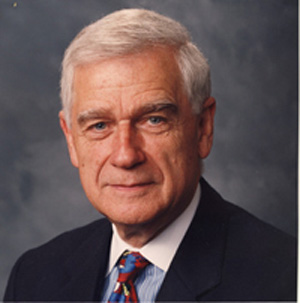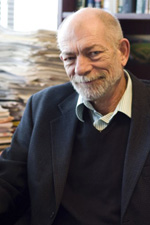Evangelical
They say at some point in their lives great leaders experience a "dark night of the soul," or a period in life when your feet, knees, and face scrape and stick to the proverbial bottom." It is a time when even your soul feels forsaken. Ultimately, the dark night is not about the suffering that is inflicted from outside oneself, even though that could trigger it. It is about the existential suffering rooted from within. St. John of the Cross, the 16th century Carmelite priest, described it as a confrontation, or a healing and process of purification of what lies within on the journey toward union with God.
"Whenever you face trials of any kind," explained the apostle James, "consider it nothing but joy, because you know that the testing of your faith produces endurance; and let endurance have its full effect, so that you may be mature and complete, lacking in nothing." (James 1:2-4)
Lean and lanky, the 30-something teacher probed the congregation with a practiced eye as he wound down his presentation. Ezekiel, or "Zeke" (pseudonym), teaches at a secondary school in another country. Backed up by a carefully constructed PowerPoint presentation, Ezekiel shared his passion for sensitively pouring truth and grace into the lives of his students, particularly the girls. His blue eyes blazed as he asked if a woman in the Community Christian Church (not its real name) congregation would be willing to come forward and pray for the women of his host country.
No one moved.
 Mark O. Hatfield's political witness shaped a whole generation of students, teachers, pastors, and social activists in the evangelical community and beyond. The voice of Christians today who plead for social justice and peaceful alternatives to war would not have emerged with its strength and clarity in the 1970s without his leadership. His death underscores the vacuum of such spiritually rooted voices uncompromising in their commitments to peace and justice within the cacophony political rhetoric today.
Mark O. Hatfield's political witness shaped a whole generation of students, teachers, pastors, and social activists in the evangelical community and beyond. The voice of Christians today who plead for social justice and peaceful alternatives to war would not have emerged with its strength and clarity in the 1970s without his leadership. His death underscores the vacuum of such spiritually rooted voices uncompromising in their commitments to peace and justice within the cacophony political rhetoric today.
One of my life's greatest privileges and joys was to work as an assistant to Senator Mark O. Hatfield for nearly a decade, from 1968 to 1977. I saw first-hand what courageous leadership, combined with unswerving compassion and civility, looked like within the political life of that turbulent and formative era. Those experiences are shared in my book, Unexpected Destinations (Eerdmans).
Similar to many of my Western counterparts, my first thoughts when I first heard about the attacks in Norway went to extreme Islamic terrorism. I had heard about the growing tensions in Scandinavia because of the increasing Muslim population and cultural shifts arising as a result. Thus, when I heard through a friend that a Norwegian school had been attacked, I assumed the attack to be a response from a Muslim terrorist group. I asked if it was al Qaeda or such other organization. My friend responded, "Probably." Thus, you can imagine my surprise when I saw the picture of the suspect who appeared very Scandinavian with fair skin and complexion.
According to the New York Times, the attacks in Oslo killed at least 92 people and the orchestrator left behind "a detailed manifesto outlining preparations and calling for Christian war to defend Europe against the threat of Muslim domination." If I had read that statement out of context, I would think one was talking about the Christian Crusades of the 12th century.
John Stott died this Wednesday. He was 90 years old. What many people don't understand is that he was the most influential 20th-century evangelical leader in the world, with the exception of Billy Graham. Stott became the Anglican rector of All Souls Church in downtown London at the age of 29 in 1950, and he stayed there for his entire ministry. But from his parish at Langham Place in the city's West End, and right across from BBC headquarters, John Stott spoke to the world with 50 books that sold 8 million copies. He also traveled the globe , speaking, teaching, convening, mentoring, and bird watching -- a personal passion.
Perhaps the most telling thing about this man is all the personal stories about "Uncle John" that the world is now hearing, from many Christian leaders around the world who were profoundly influenced, encouraged, and supported by John Stott. And secondly, how such a giant in the Christian world remained so humble, as testified to by those who knew him who say how "Christ-like" he was.
In response to Sojourners' radio ads about the budget debates, the Family Research Council's political action committee has launched radio ads in Kentucky and Ohio arguing that deficit reduction should cut programs that serve poor and vulnerable people. The ads assert that it is the private individual, not government, who has a responsibility to the poor. The ads say, "Jesus didn't instruct the government of his day to take the rich young ruler's property and redistribute it to the poor. He asked the ruler to sell his possessions and help the poor. Charity is an individual choice, not a government mandate."
This could put the speaker of the House, a Catholic, in a difficult position. Catholic social teaching instructs that the government does have a direct responsibility to the poor and that private charity is only one of the ways that Christians express concern for "the least of these." This ad sets itself in direct opposition to that teaching and the values that it comes from. The speaker was already in a tough spot when the Catholic bishops came out with a strong critique of the House plan, but now he has a powerful political organization calling for him to ignore Catholic social teaching all together.
Shakespeare said a rose by any other name would smell as sweet. Maybe, but a Stink Rose by any other name (say... garlic?) might get more play.
On July 19, Campus Crusade for Christ announced its plan to officially change its name to Cru in early 2012.
Brown v. Board of Education had not yet been fought in the Supreme Court when Bill and Vonetta Bright christened their evangelical campus-based ministry Campus Crusade for Christ in 1951. The evangelical church context was overwhelmingly white, middle class, and suburban. The nation and the church had not yet been pressed to look its racist past and present in the face. The world had not yet been rocked by the international fall of colonialism, the rise of the Civil Rights movement, the disillusionment of the Vietnam War, the burnt bras of the women's liberation movement, the fall of the Berlin Wall, or the rise of the Black middle class (more African Americans now live in the suburbs than in inner cities). In short, theirs was not the world we live in today. So, the name Campus Crusade for Christ smelled sweet. Over the past 20 years, though, it has become a Stink Rose ... warding off many who might otherwise have come near.
 My office has two overflowing bookshelves, with more books stacked on top and on the windowsill. But above my desk within easy reach is a small shelf. On it I keep those books I most regularly use in thinking and writing. Here are the top 10.
My office has two overflowing bookshelves, with more books stacked on top and on the windowsill. But above my desk within easy reach is a small shelf. On it I keep those books I most regularly use in thinking and writing. Here are the top 10.
1. The Bible: What can I say about the foundational source of God's guidance in everything? I read or refer to it nearly every day. It was given to us "for teaching, for reproof, for correction, and for training in righteousness" (2 Timothy 3:16).
2. The Book of Common Prayer: I am not Anglican/Episcopalian, but there is something in the formal prayers of the traditional liturgy that resonate with my soul. On those days I really don't feel like praying or can't find the words, it's comforting to have a place to turn for inspiration.
Today is another intense day of politics at the White House. The debt default deadline is fast approaching. The stakes for the nation are high as politicians can't agree on how to resolve the ideological impasse on how to reduce the deficit before the nation defaults on its financial obligations.
Yesterday, before Congressional leaders were due at the White House for critical negotiations, I, along with 11 other national faith leaders, met with President Obama and senior White House staff for 40 minutes. We were representing the Circle of Protection, which formed in a commitment to defend the poor in the budget debates. Sitting in the Roosevelt Room of the White House, we opened in prayer, grasping hands across the table, and read scripture together. We reminded ourselves that people of faith must evaluate big decisions on issues like a budget by how they impact the most vulnerable.
A recent U.S. Court of Appeals ruling, and the subsequent fallout here in New York, hits close to home for many of us New Yorkers. The ruling, which came down on June 2, allows for the city of New York to restrict religious groups from meeting in schools
When evangelical politicians pronounce on topics like the origins of the universe, the results are almost always awful -- embarrassing, infuriating, unwatchable. When a reclusive, visionary filmmaker like Terrence Malick treats the same subject matter, as he does in his new movie The Tree of Life, one is transported. Which is a useful reminder that the mysteries of creation are best grappled with through art. The book of Genesis, after all, begins not with scientific description or theological argument, but with a poem.
I very much appreciated all the good things that Lucy Bryan Green had to say about "The Family" in the June 2011 issue of Sojourners m
Some controversy has arisen about an ad campaign that a new coalition wanted to run in Sojourners on the issue of the LGBTQ community and the church. We chose not to run the ad as this is an issue we want to openly discuss on and through our editorial pages and not through our ad space. Like the larger church, Sojourners' constituency, board, and staff are not of one mind on all of these issues. However, we at Sojourners seek to foster honest, fair, and loving dialogue among Christians. LGBTQ issues may not be our primary calling as our work against poverty and hunger, and for peace, but based on some reactions to our decision, I want to use this as an opportunity to clarify the positions and practices of Sojourners on this important discussion on the life of the church in the early 21st centur
Do you find yourself reluctant to attend women's retreats, Bible studies, or conferences because too often they focus on fashion, dieting, women's emotions, and new forms of abdominal exercises?